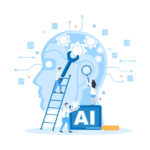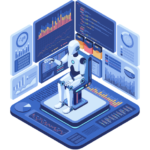What AI can do for your SAAS: Embrace the future of software, optimizing user experience and driving unparalleled growth with AI integration.

As technology advances, business leaders realize the benefits of incorporating artificial intelligence (AI) into their products and services. AI can revolutionize the world of software as a service (SAAS) by streamlining processes, improving efficiency, and boosting revenue.
What is AI?
Artificial intelligence refers to computers that can do human-like tasks. These tasks may include recognizing speech patterns, making decisions based on data analysis, and even learning from experience. AI has been around for decades, but in recent years, improvements in computing power and big data have made it more accessible to businesses.
The Benefits of AI
The benefits of incorporating AI into SAAS products are numerous. Firstly, it can help businesses automate data entry or information retrieval tasks. Employees can concentrate on higher-value tasks like innovation and customer service.
Another benefit is that AI can help identify patterns in data that may not be immediately apparent to humans. This can lead to better decision-making and improved performance across various metrics.
The Importance of AI in SAAS
For SAAS companies specifically, incorporating AI into products is essential for staying competitive in an increasingly crowded market. Customers expect personalized experiences with intuitive interfaces that respond quickly to their needs.
SAAS companies can use predictive analytics and machine learning algorithms to deliver these experiences at scale while minimizing errors and reducing costs. In addition, SAAS companies can improve efficiency and customer satisfaction by automating routine processes.
Enhancing Customer Experience
Personalized user experience with AI-powered chatbots
Personalized interactions are among the most effective ways to enhance your customer experience. You can achieve this by integrating AI-powered chatbots into your SAAS platform. These bots can help users navigate the platform, answer frequently asked questions, and even offer personalized product recommendations based on browsing history.
The chatbot’s natural language processing (NLP) capabilities allow it to interpret and respond to customer inquiries in a conversational tone. This creates an engaging and interactive experience, making customers feel valued and attended to.
Additionally, chatbots are available 24/7, ensuring that customers can access support whenever needed. This also reduces response time for customer inquiries, increasing satisfaction and loyalty.
Predictive analytics for customer behavior and preferences
Another way AI can enhance customer experience is through predictive analytics. By analyzing customer behavior and preferences data, you can anticipate their needs and deliver customized experiences. For example, if a user frequently purchases fitness-related products, you could recommend other relevant products, such as workout equipment or supplements.
This increases the likelihood of them making additional purchases and creating a more personalized shopping experience. Predictive analytics also helps you identify patterns in customer behavior which you can use to make informed decisions about future product development or marketing strategies.
Streamlining customer support with automated responses
Customer support is a critical aspect of any SAAS platform. Still, it can take time for companies to handle large volumes of inquiries. You can streamline the process by automating responses with AI-powered tools such as email filters or ticketing systems while providing quick answers to customers.
Machine learning algorithms are used to learn from past customer interactions. Their accuracy improves as they accumulate more data over time, resulting in more efficient and personalized responses.
Automated responses can also be used for self-service options such as resetting passwords or tracking order status. This frees up your customer service team to handle more complex inquiries, improving the customer experience.
Improving Efficiency
Automating Routine Tasks with AI-powered Tools
Automating mundane, repetitive tasks is one of the most significant benefits of AI. It saves time and resources and reduces human error.
For instance, a SAAS product can use AI-powered tools to automate tasks such as data entry, report generation, and scheduling appointments. These tools can be programmed to perform these tasks accurately and at a much faster pace than humans.
Using AI-powered automation tools also frees up employees’ time. It allows them to focus on high-level tasks that require critical thinking or creativity. This improves their job satisfaction and ultimately leads to a more productive workforce.
Optimizing Resource Allocation with Predictive Analytics
AI can also improve efficiency in SAAS products with predictive analytics. By analyzing data patterns, predictive analytics can help businesses optimize resource allocation. For example, it can determine which features are most frequently used by customers and allocate resources accordingly.
Predictive analytics can also help companies forecast future demand for their products or services, allowing them to adjust resources accordingly. This helps avoid overstaffing or underutilization of resources, leading to better efficiency.
Reducing Human Error with Machine Learning Algorithms
Human error is an inevitable part of any business process. However, with the use of machine learning algorithms, this risk can be significantly reduced. The algorithms in machine learning analyze big data and learn from it.
They then apply those patterns to new datasets to make predictions or decisions. This allows SAAS products to detect errors in real-time and take action before they become significant issues.
For example, if an algorithm detects an anomaly in customer behavior that could indicate fraudulent activity, it could immediately flag it for further investigation. Machine learning algorithms are also useful for process optimization.
They can analyze various steps in a business process and identify areas where bottlenecks occur. By optimizing the process, we can reduce wait times and improve efficiency.
Boosting Sales and Revenue
Targeted Marketing Campaigns Using Data-Driven Insights
AI technology’s most significant advantage is its ability to analyze vast amounts of data with incredible speed. This enables businesses to create highly targeted marketing campaigns tailored to their customer’s needs and preferences. AI algorithms can analyze customer behavior, demographics, and other vital data points to develop more effective marketing strategies.
For example, AI-powered tools can help you identify which customers will respond positively to specific marketing messages or promotions. Analyzing past purchase history and browsing behavior can help you create targeted email campaigns.
Automated Lead Generation and Qualification
Another way that AI technology can help boost your sales is by automating your lead generation and qualification processes. Instead of relying on human sales reps to manually sift through thousands of leads, you can use machine learning algorithms to automatically sort leads based on factors like budget, company size, location, industry type, and other vital criteria.
This saves time for your sales team and ensures they focus on the most promising prospects. With automated lead generation tools, your sales reps will have more time for personalized outreach efforts with qualified leads.
Dynamic Pricing Strategies Based on Market Trends
AI technology can also help you optimize pricing strategies by analyzing real-time market trends. With machine learning algorithms constantly monitoring buyer behavior and market conditions, you can adjust prices dynamically based on supply-demand dynamics or changes in customer interest.
For instance, if certain products or services become particularly popular during specific times of the year or events (like Black Friday), you could use dynamic pricing strategies to adjust prices in real-time and maximize profits.
The Future is AI for Sales and Revenue Boosting
Businesses could revolutionize how they generate revenue and sales with AI. Automating lead generation, creating highly targeted marketing campaigns, and dynamically adjusting prices will increase your chances of success. As AI technology continues to evolve, it’s clear that its impact on the world of business will only continue to grow.
Ensuring Data Security and Privacy
Detecting potential security breaches with machine learning algorithms
Data security and privacy are a top priority for any SAAS company. Data is increasingly being stored online, so it’s essential to spot security breaches proactively.
Machine learning algorithms can help with this by constantly analyzing user behavior and identifying patterns that could indicate a breach is imminent. For example, machine learning models can detect when users attempt to access their accounts from an unfamiliar location or device.
This could indicate that someone else is attempting to gain unauthorized access to the account. The machine learning algorithm can then alert the user or take other measures to prevent the breach.
Additionally, anomaly detection algorithms can flag unusual activity on the system that could indicate a potential breach. Data is increasingly stored online, so spotting security breaches early is crucial.
Protecting sensitive data through encryption and access control measures
Encryption is another critical component of data security for SAAS companies. Hackers cannot access stolen data if passwords and credit card information are encrypted.
Access control measures are also crucial for protecting sensitive data. These measures limit who has access to certain types of information within the company, reducing the likelihood of accidental or intentional misuse.
Modern SAAS platforms use multi-factor authentication (MFA) as an extra security layer. Hackers have a much harder time gaining access to accounts with multi-factor authentication.
Using machine learning algorithms alongside solid encryption and access control measures helps ensure that sensitive data remains secure on SAAS platforms. By staying vigilant and proactive in detecting potential breaches early on, companies can protect their users’ information and maintain trust in their brand.
Conclusion
Incorporating AI into SAAS products brings numerous benefits to both businesses and consumers. The use of AI-powered tools has the potential to significantly enhance customer experience, improve efficiency, boost sales and revenue, and ensure data security and privacy.
By using personalized user experiences with AI-powered chatbots, businesses can provide a more efficient means of communication to their customers while streamlining customer support with automated responses. Additionally, AI makes predictive analytics for customer behavior and preferences possible, allowing businesses to tailor their services according to their audience’s needs.
The automation of routine tasks through AI-powered tools can not only improve efficiency but also optimize resource allocation with predictive analytics. Additionally, it reduces human error with machine learning algorithms by allowing machines to handle the most repetitive tasks while freeing up personnel for other essential job functions.
Targeted marketing campaigns using data-driven insights are highly effective when boosting sales and revenue for SAAS products. AI can help businesses grow their sales pipeline by automating lead generation and qualification.
Dynamic pricing strategies based on market trends are also made possible through predictive analytics. Ensuring data security and privacy is crucial in any technology-focused industry.
Detecting potential security breaches with machine learning algorithms is essential while protecting sensitive data through encryption and access control measures. Overall, the incorporation of AI into SAAS products allows for greater efficiency, productivity, personalization, accuracy, and cost savings, which should leave business owners feeling optimistic about the future possibilities this technology offers them.
Jane Watson is a seasoned expert in AI development and a prominent author for the “Hire AI Developer” blog. With over a decade of experience in the field, Jane has established herself as a leading authority in AI app and website development, as well as AI backend integrations. Her expertise extends to managing dedicated development teams, including AI developers, Machine Learning (ML) specialists, and other supporting roles such as QA and product managers. Jane’s primary focus is on providing professional and experienced English-speaking AI developers to companies in the USA, Canada, and the UK.
Jane’s journey with AI began during her time at Duke University, where she pursued her studies in computer science. Her passion for AI grew exponentially as she delved into the intricacies of the subject. Over the years, she honed her skills and gained invaluable experience working with renowned companies such as Activision and the NSA. These experiences allowed her to master the art of integrating existing systems with AI APIs, solidifying her reputation as a versatile and resourceful AI professional.
Currently residing in the vibrant city of Los Angeles, Jane finds solace in her role as an author and developer. Outside of her professional pursuits, she cherishes the time spent with her two daughters, exploring the beautiful hills surrounding the city. Jane’s dedication to the advancement of AI technology, combined with her wealth of knowledge and experience, makes her an invaluable asset to the “Hire AI Developer” team and a trusted resource for readers seeking insights into the world of AI.







